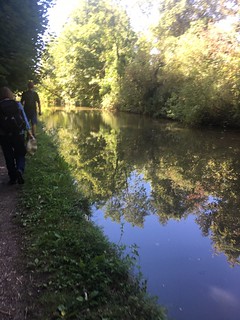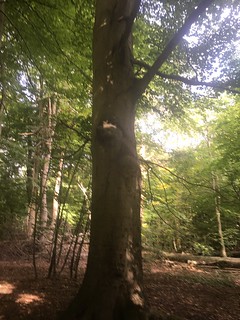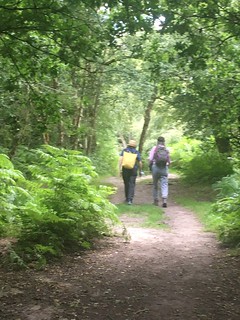Tring to Berkhamsted via Tom's Hill walk
A canal, Ashridge estate, Berkhamsted Common and World War One trenches
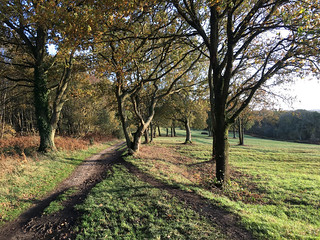
Berkhamsted to Tring via Toms Hill walk
Oct-20 • Saturdaywalker on Flickr
swcwalks swcwalk366 banner 50606176393
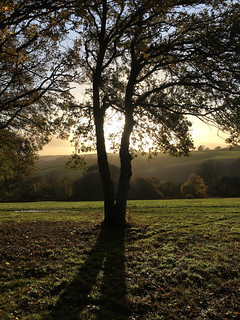
Berkhamsted to Tring via Toms Hill walk
Oct-20 • Saturdaywalker on Flickr
swcwalks swcwalk366 walkicon 50606918801
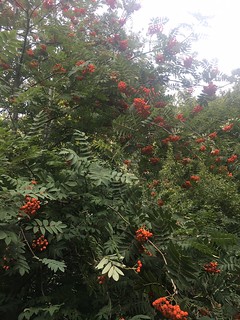
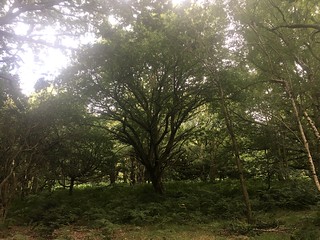
| Length |
15.47 km (9.61 miles) |
|---|---|
| Toughness |
4 out of 10 |
| OS Map |
Explorer 181, Landranger 165. Tring, map reference SP951122 is in Hertfordshire, 13 km (8 miles) east of Aylesbury. Berkhamsted, map reference SP993082, is also in Hertfordshire, 6 km (3.7 miles) south-east of Tring. |
| Features |
This walk takes a completely different route to the Book 2 Classic Tring to Berkhamsted. The start follows the Grand Union Canal, then you walk through ancient woodland and commons, passing chimneyed lodges and an impressive college building. You enjoy extensive Chiltern views, pass some trenches dug by World War I soldiers, to finish in Berkhamsted at a waterside pub. This walk is especially pleasant in late autumn when the beech trees in the Ashridge Estate display lovely leaf colour. |
| Walk Options |
Instead of the posted start you could opt for the start of the Book 2 Tring walk which takes you to Ivinghoe Beacon, then continue via Wards Hurst Farm to Little Gaddesden, to rejoin the posted walk at the lunchtime pub. This makes for a longer and more energetic walk of some 12 miles overall. Or after the lunchtime pub you could double back to Tring via the Ashridge Estate. This makes for a shorter walk overall. For those who enjoy canal-side walking, it is possible to stay on the canal towpath at Cowroast lock and continue beside the canal all the way to Berkhamsted, making for a relaxing 4 plus mile canal-side walk. |
| History |
Tring: is a small market town with a population of 12,000 located within an area classified as being of Outstanding Natural Beauty, and some 30 miles north of Central London. There has been a settlement at Tring since prehistoric times and the market town is mentioned in the Domesday Book. Tring’s railway station is sited some two kilometres east of the town and regrettably you see nothing of the town on this walk. The Ashridge Estate: comprises some 5,000 acres of beech and oak woodland, commons and chalk downland. The varied landscape supports a rich variety of wildlife, with carpets of bluebells in spring, rare butterflies in summer and rutting fallow deer in autumn. The Estate is steeped in history, from iron age forts, Roman settlements, a Royal park, Capability Brown, both World Wars to its present day, now in the ownership of the National Trust (since 1926). Its most famous owner was Francis, 3rd Duke of Bridgewater. Known as the "Canal Duke", his pioneering work in the sector is commemorated in the Bridgewater Monument, erected in 1832. You can detour from the walk to the monument and climb it for a small fee from 1pm to 5pm April to October weekends and bank holidays for fine views over the countryside: ask in the tea kiosk opposite to get access if the tower is not open during these hours (it depends on how many volunteers the Trust has available on any given day). In 1759 Bridgewater employed engineer James Brindley to build a canal from Manchester to Worsley, Lancashire, one of his other estates, to transport coal from his mines there. Brindley's innovation - a technique called "puddling" - enabled the canal to travel in an aqueduct across the Irwell River valley. The aqueduct became the wonder of the age, and sparked a canal building boom that lasted till the advent of the railways in the 1830s. Bridgewater himself is buried in Little Gaddesden Church. Ashridge College (Ashridge Executive Education) is today a business school, part of the Hult International Business School with campuses in seven cities around the world. Ashridge is rated in the top ten business schools in the UK. The main building started life as a stately home built between 1808 and 1814 in the gothic revival style, one of the largest buildings in this style in the UK. Since 2020 the college has been home to an artisan cafe within its main building - the Bakehouse - see lunch options below. Berkhamsted is an historic market town in Hertfordshire, with a population today of some 18,500. The town’s main historic claim to fame is its link to the Norman Conquest in 1066. After the Battle of Hastings, the Anglo-Saxon leadership surrendered to the Norman encampment in Berkhamsted. During the 13th and 14th centuries the town thrived as a wool centre. It then went into decline and was only revived by the building of the canal. Berkhamsted was the childhood home of writer Graham Greene, whose father was the headmaster of Berkhamsted School. Berkhamsted Castle (tel 01375 858486), next to the railway station, is a classic Norman motte and bailey castle, built by Robert, Count of Mortain, the half-brother of William the Conqueror. Thomas a Becket, Henry II's chancellor and later martyred when archbishop of Canterbury, lived here from 1155 to 1165. There is not much to see, just a few ruined walls, but entrance is free, and if you have just missed a train at Berkhamsted, it is worth a quick look. The castle is open until 4pm in winter and 6pm in summer. Berkhamsted WW1 Troop Training Trenches in September 1914 the Inns of Court Officers’ Training Corps (nicknamed The Devil’s Own) set up a tented camp in Berkhamsted, close to the railway station, for officers’ training in preparation for action in the Great War. Over the next four years some 12,000 officers – some straight out of public school - trained in the camp and dug trenches on the nearby common to assimilate conditions in Flanders. Some 13 km of trenches were dug, and of these 500 metres remain and have been preserved thanks to the Chiltern’s Society. Today’s walk passes the trenches towards walk-end, and there is an interpretation board cum information plaque for visitor reference. Do spend a little while looking at this piece of recent history, and if you wish, walk in the trenches to the right of the path. Of the men trained, fifty percent were casualties of war with 2,200 killed in action. Three VC’s were awarded to the Devil’s Own, and on the golf course next to the Common is a simple stone obelisk as a memorial to the men. Little Gaddesden Village Green War Memorial You pass this striking memorial a few minutes after your lunch stop in the village pub. This unusual brick and stone structure was built circa 1920 by Ashridge Estate’s bricklayers with the roof structure built by a local carpenter. The Memorial is in three sections – a central stone pediment under a pitched tiled roof with brick flanking walls on which the names of the fallen – 23 from WW1 and 6 from WW2 – are inscribed on stone tablets taken from Ashridge House. |
| Travel |
Take the train nearest to 10 am from London Euston to Tring, journey length from 40 to 52 minutes. There are four trains an hour from Berkhamsted back to Euston. Rail ticket: buy a day return to Tring. |
| Lunch |
Your pub lunch stop on this walk after 2.25 hours of walking is the Bridgewater Arms (tel 01442 842408) in the village of Little Gaddesden. Open seven days a week, the pub serves good value food from a varied menu, in comfortable internal dining areas and a very pleasant beer garden. Food is served all day weekdays from 12 noon until 9 pm, and at weekends from 10 am until 9 pm. Your second lunch option - some 30 minutes later in the walk after Little Gaddesden - is the Bakehouse artisan cafe within a single storey section of the main building at the front of Ashridge House. Open seven days a week from 08-30 am until 5 pm (and between 5 pm and 9 pm for dinner) this licensed cafe has a varied menu to cover most tastes and it makes for a very pleasant alternative to the Bridgewater Arms. In clement weather the tables and chairs outside the front of the Bakehouse come into play. Near the pub in Little Gaddesden is a village store, where provisions can be purchased for picnickers. A good picnic spot is the churchyard of the church in Little Gaddesden, some 400 metres or so from the pub. |
| Tea |
Just before the railway station you come to the Crystal Palace pub on the canal, which reopened (December 2021) following refurbishment after a lengthy period of closure. Head south-east along the canal towpath and in 300 metres you come to the The Boat , a canalside pub with a pleasant outdoor verandah. Continue past the Boat along the canal and you soon come to The Rising Sun pub, popular with lovers of real ale. Back in the centre of Berkhamsted there are further pubs and a number of tea shops. Some of these tea shops stay open at tea time whilst others - annoyingly - close at 4 pm ie tea time ! One in the latter category is The Black Goo Cafe (tel 07596 224531) at 134 High Street, above the Home and Colonial Antique Shop (a steep climb up stairs). With branches also in Tring and Thame, this cafe is a very popular spot in town, open Monday to Saturday from 9.30 am to 4 pm, and on Sunday from 10 am to 4 pm. It's speciality is a "Blackgoo Dirty Tea " (don't ask). But even if SWC walkers make it in time before closing, they have to make it past the sign on the cafe counter - "No Riff Raff" - in order to get in !!. Finally, mention must be made of Berkhamsted Railway Station Cafe which, in addition to serving hot drinks, doubles up as a wine shop, with an excellent choice of red wines, and white wines in a tall fridge - perfect for SWC walkers who like to purchase "supplies" to enjoy on their train journey home. |
| Profile | |
|---|---|
| Help Us! |
After the walk, please leave a comment, it really helps. Thanks! You can also upload photos to the SWC Group on Flickr (upload your photos) and videos to Youtube. This walk's tags are: |
| By Train |
Out (not a train station) Back (not a train station) |
| By Car |
Start HP23 5QR Map Directions Return to the start: Finish HP4 2AR Map Directions Travel to the start: |
| Amazon | |
| Help |
National Rail: 03457 48 49 50 • Traveline (bus times): 0871 200 22 33 (12p/min) • TFL (London) : 0343 222 1234 |
| Version |
Feb-24 Elsa |
| Copyright | © Saturday Walkers Club. All Rights Reserved. No commercial use. No copying. No derivatives. Free with attribution for one time non-commercial use only. www.walkingclub.org.uk/site/license.shtml |
Walk Directions
- Arriving at Tring Railway Station go up the steps and turn left to exit the station at its main, south-western exit. Turn left along the road, passing the Posting House on your left-hand side. In 240 metres, cross the road just before the road swings to the left by a road bridge, and in the entrance to Wolds Farm, take the flight of signed steps down to the Grand Union Canal .
- At the bottom of the canal steps, turn left on the towpath to head back under the bridge, to start a relaxing canal-side walk. The towpath is quite narrow in places so it is single file for walkers. In summer sections of the towpath can become overgrown, so take care. In 1,200 metres you pass under the brick road bridge No 136 and continue along the canal. In a further 440 metres cross a hump-back bridge with a sign “Welcome to Cowroast Marina” and keep ahead along the canal.
- In 280 metres you come to Cowroast Lock . Leave the towpath by the path up to the road bridge and turn left , soon passing the entrance to Cowroast Marina on your left-hand side. You are now on a country lane which swings to the right . In 105 metres [!] look out for a footpath sign on the left and turn into a field, your direction 60°. You are now on the Chiltern Way.
- In 100 metres cross the main-line railway on footbridge No 109 and at its far side continue through the next field. In 70 metres go through the field-end boundary hedge and by a footpath post turn right onto a footpath. In 60 metres at a path T-junction, turn left uphill on a car-wide grassy track heading towards Norcott Court Farm .
- Go to the right of a metal field gate (when not propped open) and after 65 metres continue uphill past the farm buildings on the farm access road. In a further 40 metres you come to a farm-track T-junction. Here turn left for 5 metres then turn right over a gravel way. In 20 metres go through a wooden swing gate with a yellow arrow and head diagonally left , up a grassy field, your direction 340°. There are often llamas or alpacas in this field and the adjacent field to its right, and they don’t seem to mind visitors.
- In 360 metres at the top left-hand corner of the field go through a wooden swing gate and pass by a metal barrier, and in 8 metres you come out into a field. Now keep ahead skirting the top edge of a field, your initial direction 340°. Follow an undulating way, down a dip and up the other side. In 215 metres your way enters a woodland strip directly ahead of you, by a yellow arrow on a post. Head up to a metal kissing gate which you pass through to then head half-left, diagonally up another grassy field, your direction 325°.
- In 200 metres at the top of the field, beside the edge of woods, pass through a metal swing gate, head down and swing right towards a wooden fieldgate, by a four-arm footpath sign (the fourth arm, pointing in the direction you are to take, is missing) enter woods, your direction 45°. You are now going to ascend Tom's Hill on a pleasant way through woodland.
- In 300 metres as you near the top of the hill go through a wooden fieldgate and keep ahead, in 35 metres coming out into the open as a track cum drive joins from the right. In a further 85 metres go through a metal fieldgate into a private car parking area, with buildings over to your right. In 80 metres you exit the car park to go past the Old Stables and Tom's Hill then Rose cottage on your left and Stable cottage on your right, and bear left to continue now along a tarmac drive, initially with a high red brick wall on your right-hand side. Soon the drive takes you through light woodland. Ignore all signed ways off to your right.
- In 340 metres the drive joins a public road at a sharp bend in the road. [!] Turn right and head along the road’s left-hand earthen verge, uphill for 50 metres until you come on your left to an access drive into the National Trust’s Ashridge Estate . Turn left and head along the surfaced drive through woodland and in 295 metres go through a wooden swing gate to the left of a wooden fieldgate to pass on your left-hand side Old Copse Lodge .
- Continue ahead past the lodge on what is now an earthen track, through light woodland, where there is evidence of recent cherry laurel and rhododendron invasive removal. Ignore ways off and in 480 metres cross over “Five Cross Junction” and keep ahead. In a further 500 metres you reach Thunderdell cottages on your right-hand side and come out onto a small – but busy - public road, which you cross over with care to enter the Ashridge Estate .
- You pass on your left-hand side the attractive chequered Thunderdell Lodge , with its stone walled garden. Some 10 metres beyond the end of the garden wall [!] you leave the estate road and bear left by a footpath post into woodland. But Note The gpx route takes you further along the estate road, until you come to a tarmac cross path, which you join by turning left. This is the same tarmac path which these written directions describe below.
- Having turned left off the estate road, follow the meandering woodland path for some 210 metres until you come out at a T-junction with the broad Princes Riding path. Here you can look left and see the Bridgewater Monument and look right to see the outline of Ashridge Hult College which you will be exploring in the afternoon.
- Directly behind Princes Riding path (ahead of you) is a golf course. Note There is a public footpath which crosses diagonally right across the fairway ahead of you, which you could take, but from time to time the golf course managers put up notices asking you to take an easy, convenient diversion which does not interrupt play. We will take this diversion as follows.
- Turn right along Princes Riding path. In 170 metres you come to a tarmac cross path (where the gpx route joins from the right). Turn left onto this path and keep ahead, with a golf green on your left. You are now on the access drive to Old Park Lodge.
- You pass on your left the red brick Old Park Lodge , an unusual lodge with a sundial on its front elevation. Cross over grass then an earth track and look out ahead for a blue footpath sign, which directs you past and alongside a barn on your left then downhill through light woodland, in 100 metres coming out onto a golf course. Directly ahead of you is the large clubhouse, the 19th hole.
- Follow directional signs and yellow topped markers down over a fairway then uphill, passing to the left of the clubhouse. You keep ahead , skirting woods until you come out onto a tarmac access road. Pass a timber clad building on your right and keep ahead along the road. In 200 metres at a road T-junction, cross over , then a grassy verge and at a footpath sign to your right [!] take the hedged alleyway between two houses, gently downhill.
- In 150 metres leave the alleyway and continue ahead through light woodland. In 90 metres cross a golf T immediately to your right and in 40 metres re-enter light woodland, to head downhill to a dip, and in 70 metres enter a fenced-in path. Note on your right the attractive period house with tall chimneys. Continue down then up this path which comes out onto a main path at a T-junction. Now head up some wooden steps to another enclosed path ahead and slightly to your left. In 150 metres this path comes out into the car park for the Bridgewater Arms, your lunchtime pub, which is directly opposite.
- Coming out of the pub after lunch, turn left and head down the road. You pass village houses and in 220 metres you come to a road junction with an unusual, but tasteful, War Memorial on your left-hand side. Immediately opposite this memorial is a stone memorial cross with stone seating. Head down the lane to the right of the memorial cross, signed “Welcome to Ashridge Hult”. If you wish you can walk along the soft verge to the left of this tarmac lane.
- In 280 metres continue ahead at the first sign saying Ramp. In another 300 metres you come to the second sign saying Ramp. [!] Here bear left off the lane and head down the attractive grassy Golden Valley . Walk through the valley, passing a bench to the left, until in 300 metres you come to a minor, but clear, cross paths. [!]. The path to your left heads down from a steep hillside (there is another bench half-way up this hillside). The path to your right heads steadily up a grassy hillside. [!] You take the grassy path on your right and at the top of the incline you re-join the tarmac lane, close to the entrance to Ashridge House, now an international business school.
- Head up the lane towards the House but do not go through the entrance gate unless you plan to have lunch in the Bakehouse artisan cafe (as advertised on the entrance gate) in which case go through the gate walk along the road in front of the House and in a little over 100 metres you come to an entrance in the period building's frontage giving access to the cafe and courtyard beyond. Otherwise, stay on the lane as it swings to the right in front of the House. A short distance ahead there is a car park over to your left. Here turn left off the road and walk over grass parallel to the main building some 60 metres over to your left. Keep ahead as you head for a small wooden security lodge at the exit road to the college.
- In some 260 metres pass to the left of this security lodge then head diagonally, left over grass to join a public footpath along a hedge. Keep ahead along the hedge and at its end turn left to follow the footpath which skirts the newer college buildings to your left, with woodland to your right, your direction 150°. Head down this path and in 500 metres you come to the end of the college buildings on your left. The path continues downhill, now with woodland on both sides, and in a further 210 metres you come down to a valley public road.
- Turn left along the valley road. In 160 metres you pass on your right Berkhamsted Lodge. In a further 110 metres you pass on your left the entrance to Birch House. Here on your right is a small gravel car parking area. [!] Turn right into this area, ignore the footpath to your right and instead take the path left , uphill, to pass to the left of a prominent conifer and at the first path junction just ahead [!] turn right uphill. In 80 metres at a small path junction turn right and in 65 metres at the next wider junction turn left and head down to enter a field.
- Take the path straight ahead up this grassy field, to the left of some trees ahead. At these trees go over crosspaths and continue ahead over grass, on a path on the level, your direction 145°, aiming for the treeline ahead. In some 325 metres and just before you reach the treeline the path comes out onto a stony track. Turn right along this track and within 100 metres bear left and head into the woods ahead of you. In 50 metres you come on your left to a National Trust sign for Frithsden Beeches .
- Continue straight ahead along this earthen track which soon narrows to a woodland path. In 230 metres at a dip go over a crosspaths. In a further 280 metres go over another crosspaths. In 75 metres at a third crosspaths by a post with multiple arrows [!] turn left into Berkhamsted Common .
- Keep ahead, gently downhill, soon with fine views to your right of the town of Berkhamsted. Amongst the sights is a white tower on the distant skyline. On Google someone says it looks like Rapunzel should be in residence! – but it is actually a water tower.
- Some 460 metres along this path you come to a bench and information panel on your right-hand side. This explains that the odd shapes in the ground here are the remains of trenches dug by officers’ practising trench warfare in World War One. It is worth spending a little while exploring this fascinating piece of history. Try walking in the trenches.
- Some 145 metres beyond the trench information panel the path forks at a footpath post [!] and you take the smaller path to the right , your initial direction due south. This woodland path heads downhill to a dip at a cross paths then, uphill,coming out to a public road. Cross over and continue on the bridleway directly opposite.
- Keep ahead on this bridleway, ignoring ways off, uphill and within the right-hand edge of a wood until in 205 metres you come to a house directly ahead. Here turn sharp right by a signpost for Berkhamstead station 1 mile and walk along a broad, grassy ridge with more extensive views to your right on your approach to Berkhamsted .
- In 400 metres ignore a three-arm signed footpath descending diagonally to your right down the hillside. Keep ahead with a hedge on your left for a further 200 metres where, just before you come to more houses on your left, you pass through a propped-open rusty metal fieldgate [!] to take a clear broad – but unsigned - grassy path on your right , diagonally down the hillside, your direction 210°.
- In 185 metres at the bottom of the field cross over a path cum track and enter another field ahead of you. Your way heads down then swings left. At the far end of this field go through a gap (the metal kissing gate is still missing, November 2023) and come out onto a public road. Cross this road and turn left along it. You are skirting the grounds of Berkhamsted Castle on your right.
- Continue along the road and you soon come to a railway bridge ahead of you. Go under the bridge and immediately ahead of you is the Crystal Palace pub on the canal. This pub reopened in December 2021 following refurbishment after a lengthy period of closure. If you do not want to visit one of the canal-side pubs and wish to head for the railway station, or head into town, turn right in front of the Crystal Palace pub and head along Station Road. Within 200 metres you come to Berkhamsted Railway Station on your right-hand side.
- For the canal-side pubs, keep ahead past the Crystal Palace pub for a few metres and you come to The Grand Union Canal . Turn left along its towpath for 300 metres, and you come to Ravens Lane Lock (No 34) with the The Boat pub just beyond it. A little further along the canal you come to The Rising Sun pub which specialises in real ale.
- After visiting one of these pubs return along the towpath to the Crystal Palace pub, and then to Berkhamsted Railway Station, as above. Inside the station foyer on your right-hand side you have the Station Cafe , for hot drinks and "supplies". Go to platform 4 for your train journey back to London.
